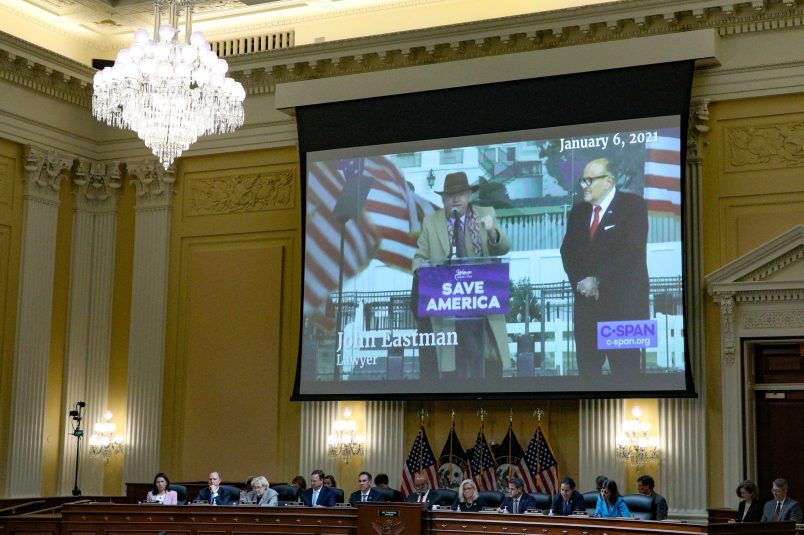In Thursday’s Jan. 6 Committee hearing, former Vice President Mike Pence’s chief counsel Greg Jacob recalled the moment when Donald Trump’s top election theft advisor, John Eastman, admitted that even he didn’t believe his plot to steal Trump a second term was legitimate.
It was on Jan. 5, the day before the Capitol attack: In a discussion with Eastman, Jacob said he argued that if Pence did what Trump and Eastman wanted — suspend the certification of Joe Biden’s electoral victory, or simply reject certain Biden electors outright — the Supreme Court would reject the move unanimously.
“He initially started, ‘Well, I think maybe we would lose only 7-2,’ and after some further discussion acknowledged, ‘Well, you’re right, we would lose 9-0,’” Jacob recalled, referring to Eastman.
That same day, Jacob said Eastman told him, “Al Gore did not have a basis to do it in 2000. Kamala Harris shouldn’t be able to do it in 2024. But I think you should do it today.”
Eastman had in fact doubted the plan for months, the committee revealed. Rep. Pete Aguilar (D-CA), who ran much of the hearing, pulled up a draft letter to Trump from October 2020, in which someone had proposed the idea that Pence could determine which electors to count at the joint session of Congress.
Eastman had written a comment on that letter pushing back on that notion, saying of the Twelfth Amendment, “Nowhere does it suggest that the president of the Senate gets to make the determination on his own.” That’s not all: In a meeting that included both Trump and Pence on Jan. 4, Jacob recalled Eastman acknowledging that his proposals violated the Electoral Count Act.
“But he thought that we could do so because, in his view, the Electoral Count Act was unconstitutional,” Jacob recalled. “When I raised concerns that that position would likely lose in court, his view was that the courts simply wouldn’t get involved. They would invoke the political question doctrine, and therefore we could have some comfort proceeding with that path.”
It wasn’t just Eastman, either. On the morning of Jan. 6, just hours before rioters overtook Congress, Rudy Giuliani called White House attorney Eric Herschmann, Herschmann said in a committee deposition. (Herschmann separately told the committee Eastman’s assertion of Mike Pence’s power to decide the election was “completely crazy.”)
After a discussion with Giuliani, Herschmann recalled, Trump’s lawyer told him: “I believe that you’re probably right.”
But soon after, Giuliani took the stage at the Jan. 6 rally outside the White House and espoused the opposite view. Pence, Giuliani said, “can decide on the validity of these crooked ballots, or he can send it back to the legislators.” (“I shouldn’t really talk about that,” Giuliani told a reporter Thursday.)
Eastman, who shared the stage with Giuliani that day, demanded that Pence “let the legislatures of the states look into this so we get to the bottom of it!”
Even after the attack, Eastman kept up that argument.
Sometime later, though, things seemed to change. A few days after the attack, according to the committee, Eastman wrote to Giuliani with a request. “I’ve decided that I should be on the pardon list, if that is still in the works,” he said.
He received no pardon. Later, in a deposition before the committee, he did assert his Fifth Amendment right against self-incrimination more than one hundred times.







Nothing like a Presidential pardon request to demonstrate to the world one’s complete innocence. Me thinks Mr. Eastman got cold feet in the days after the insurrection once his illegal scheme failed miserably to move Pence. I think I understand now why Eastman didn’t want his emails exposed to broad daylight. If there is any justice in this country, Mr. Eastman will breathe his last breath in a jail cell.
Chiselin’ Trump: “That’s not true! Eastman asserted his 100th Amendment rights just five times!”
Or they were going to bury the evidence here

Which crate was suppose to house Trump?